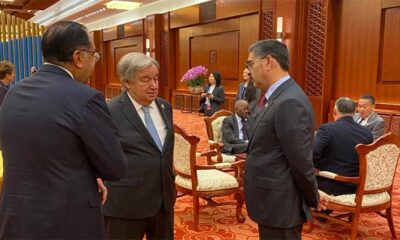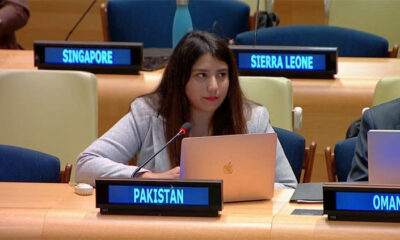North Korea launched two more ballistic missiles off its east coast on Monday, with the powerful sister of leader Kim Jong Un saying North Korea’s use of the Pacific as a “firing range” would depend on the behaviour of U.S. forces.
The launches come just two days after North Korea fired an intercontinental ballistic missile (ICBM) into the sea off Japan’s west coast, prompting the United States to hold joint air exercises with South Korea and separately with Japan on Sunday.
North Korea’s state media confirmed it fired two projectiles from a multiple rocket launcher, aiming at targets 395 km (245 miles) and 337 km (209 miles) away.
“The 600 mm multiple rocket launcher mobilised in the firing … is a means of tactical nuclear weapon,” capable of “paralysing” an enemy airfield, North Korea’s KCNA state news agency said.
Analysts said the warning about the Pacific being a North Korean firing range from leader Kim’s sister, Kim Yo Jong, could signal plans to fire more missiles further, possibly in the direction of the U.S. territory of Guam.
Japan’s defence ministry said the two missiles launched on Monday at around 2200 GMT, reached maximum altitudes of about 100 km and 50 km.
Japanese Prime Minister Fumio Kishida said he had requested an emergency U.N. Security Council meeting over the tests, and Jiji news agency said the gathering was set for 2000 GMT.
But prospects for a new round of U.N. sanctions appear slim given the previous vetoes by Russia and China amid the Ukraine crisis and a Sino-U.S. feud over a Chinese balloon in American skies.
South Korea’s military condemned the launches as a “grave provocation” that should stop immediately. President Yoon Suk-yeol’s office said it held a National Security Council meeting to review the tests and discuss countermeasures.
South Korea’s foreign ministry announced sanctions on four individuals and five entities linked to North Korea’s weapons programmes over the latest ICBM and missile tests, in what it called its fastest-ever such response to the North’s provocations.
The ministry said its nuclear envoy had phone calls with his U.S. and Japanese counterparts during which they agreed that North Korea’s provocations cannot be justified and it would face “consequences of self-indulgence”.
The U.S. Indo-Pacific Command highlighted the “destabilising impact” of North Korea’s unlawful weapons programmes, while U.N. spokesman Stephane Dujarric urged Pyongyang to halt such provocations banned under Security Council resolutions, and resume denuclearisation dialogue.
TENSIONS RISING
North Korean leader Kim’s sister warned against increased presence of U.S. strategic military assets following the joint air drills with its Asian allies over the weekend.
“The frequency of using the Pacific as our firing range depends upon the U.S. forces’ action character,” she said in a statement carried by KCNA.
The United States and South Korea are set to hold simulated nuclear tabletop exercises aimed at improving operations of U.S. nuclear assets this week, as well as annual springtime Freedom Shield field training in March.
North Korea’s foreign ministry said last week it would respond to the exercises with “unprecedentedly persistent, strong counteractions”.
“Tension on the peninsula is likely to reach its peak in coming months as North Korea is accelerating its military actions with higher frequency, and her statement indicates that it would continue impromptu missile tests using the Pacific as its shooting range,” said Yang Moo-jin, a professor at the University of North Korean Studies in Seoul.
Hong Min, a senior fellow at the South’s Korea Institute for National Unification, said Kim’s mention of the Pacific suggested the North would fire longer-range missiles more often.
Monday’s missile launch is the North’s third known weapons test this year after it fired an unprecedented number of missiles last year, including ICBMs capable of striking anywhere in the United States.
Kim Yo Jong also criticised some South Korean experts who questioned the reliability of the ICBMs saying Saturday’s “sudden” test required nine hours of preparations, calling them “disgusting” and “stupid”.
The launch took place “at the most appropriate time” considering weather conditions and after U.S. and South Korean scout planes went away, she said.
“They had better rack their brains to take measures to defend themselves, instead of doubting or worrying about other’s technology,” she said. “We affirm once again that there is no change in our will to make the worst maniacs escalating the tensions pay the price for their action.”
Post Views: 98


 Sports3 months ago
Sports3 months ago
 Fashion2 months ago
Fashion2 months ago
 Sports3 months ago
Sports3 months ago
 pakistan3 months ago
pakistan3 months ago
 pakistan3 months ago
pakistan3 months ago
 World2 months ago
World2 months ago
 World2 months ago
World2 months ago
 Sports2 months ago
Sports2 months ago


























